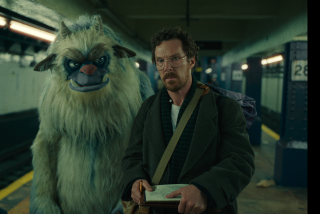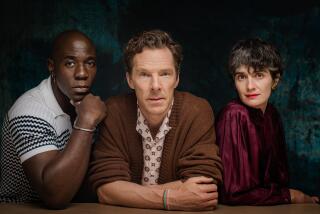Finding New Way to Run His Life
- Share via
When Eric Sisley was stealing from his family and local stores to buy booze and crystal meth, when he was sleeping in a ratty tent in the Arroyo Seco or in Pasadena dumpsters or sneaking onto the patio of his father’s house, tiptoeing through a door his little brother left open late at night, Sisley didn’t understand discipline, wasn’t into learning, didn’t care about boundaries.
Sisley could barely get from morning to afternoon to evening.
On Sunday, Sisley ran in the 17th Los Angeles Marathon.
Not much more than a year ago Sisley, 30, of Pasadena, was desperately alone and sadly afraid. He had been awarded a good start in life, received a middle-class upbringing in Pasadena, had a brother and sister and parents whose love was always available. He went to a private high school in Indiana after he found public school in Pasadena unfulfilling. He went to college, twice. He had jobs, good jobs, and had started a promising career in the Marine Corps. He was interested in the fine arts. He loved the stage and working with stained glass and being a carpenter.
And he had so little faith in himself, such a gaping wound in his soul that he almost blew his life. Almost.
Sisley got kicked out of Miami University in Ohio. He lost jobs. He stole from his family and strangers. When he couldn’t pay his bills--not the phone or gas or heat or rent--he walked onto the streets of Pasadena with a backpack, small change and little hope. That was about 18 months ago.
Sunday morning Sisley, a tall man with pale skin and a thin, blond ponytail, stood at the corner of First and Grand. It was 7:30 a.m., 90 minutes before the start of the Los Angeles Marathon. He was eager to get going. Sisley had a goal, to break 3 hours 10 minutes, the qualifying time for the Boston Marathon, although it won’t be in time for the 2002 race.
Standing next to Sisley was Terry Dunbar, a 62-year-old from La Crescenta.
From appearances, Sisley, with his flowing hair and sweet nature, and Dunbar, a clean-cut owner of his own business, seem unlikely buddies. They wouldn’t be able to run together on this day--Dunbar was going to complete the 5K portion of the marathon--but they wouldn’t consider not being together at the start.
Dunbar and Sisley met last year at the Bishop Gooden House in Pasadena. Bishop Gooden is a place where men who have problems--addictions, demons--come to live and heal. Dunbar’s family had ganged up on him. He was a drunk they told him and he needed help. “They did an intervention,” Dunbar says. “And I almost fought them. But I didn’t.”
Sisley had gone on his own to Bishop Gooden a few years earlier but had walked out when he wanted more drugs. There was, though, a spark in Sisley. He was tired of living as a bum, of doing wrong and having no one to talk to or lean on. His family had told him to stay away until he straightened up. His younger brother, Damien, had tried to help, leaving doors open at night, letting Sisley sneak in, but Damien got caught and Sisley had no one.
“I’d gotten a construction job and had $400 in my pocket,” Sisley says. “I was so tired of being dirty and alone. I walked back to Bishop Gooden. I gave them my $400, and they let me stay.”
One night Sisley got in line for dinner and found himself behind a man wearing an L.A. Roadrunners jacket. The man was Dunbar. “Do you run,” Sisley asked Dunbar. “Yes,” Dunbar said. “Do you?”
Sisley had been a cross-country runner as a teenager. Dunbar led a group of men in walks and runs at Bishop Gooden. Sisley asked if he could come along.
There was something about Sisley, about his quiet earnestness, about the way the tall, lanky man with the dreamy eyes was always on time and always eager to start the evening runs that touched Dunbar. Maybe it was because Dunbar’s son had been hurt badly by his father’s inability to put alcohol aside and now preferred to keep his distance from his father. Maybe Sisley offered Dunbar a chance to make up, in some way, for the hurt he had caused his own family.
Dunbar noticed, on the first night Sisley came to run, that Sisley had only a single pair of tattered, worn, barely functional running shoes.
“I told Eric that night,” Dunbar says, “that I’d buy him a new pair of shoes, but that if he ever relapsed, he had to give me those shoes back.”
“I still have the shoes,” Sisley says.
The shoes are worn and tattered and barely functional as racing shoes but eminently functional as a talisman, as proof Sisley has turned his life around.
On Feb. 13, Sisley celebrated his one-year anniversary of newfound drug-free, alcohol-free life. Every day he talks to Dunbar. Several times a month they run together.
Christine Sisley, Eric’s mother, says that she will always be grateful to Dunbar. “Eric’s friendship with Terry, and vice versa, has been a critical component of both their recoveries,” Christine says. “It is very special. Eric’s running is also his passion, his antidote and his lifeblood, and Terry helped him find that love of running again.”
Eric calls drugs “an ugly monster.” He doesn’t quite know how things got so out of control. “I was in college, doing stuff a lot of other people did,” he says, “and then I just kept going and didn’t stop.”
Sisley is enrolled at Pasadena City College and is aiming for a degree in fine arts. He is a freelance carpenter and lives in an apartment with a friend. He ran in the Long Beach Marathon five months ago and finished in 3 hours 21 minutes.
The last few hundred yards of the L.A. race were run on Hope Street. Sisley, at 6 feet 3 a towering figure amid the field, sprinted to the finish line. As he crossed under the big Los Angeles Marathon banner, a few minutes behind Herlinda Xol, a 29-year-old from Guatemala who ran in her bare feet, Sisley wobbled a little, then lifted his arms high.
His time? Three hours 10 minutes 22 seconds, a personal best by nearly 11 minutes. A time of hope, in a race of hope, didn’t finish on the street called Hope, though. It just began.
*
Diane Pucin can be reached at diane.pucin@latimes.com.


